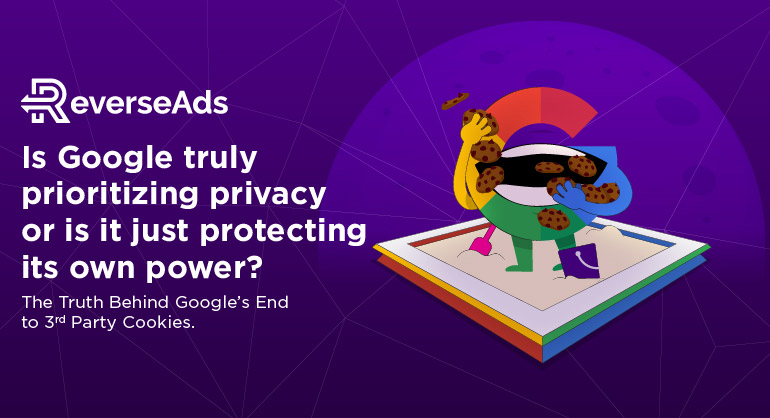The Truth Behind Google’s End to 3rd Party Cookies

Don’t feel like reading? Listen to this blog instead
The eventual end of 3rd party cookie data as a tracking mechanism within digital advertising has been expected for a while now. Google recently confirmed that it will stop using cookies to track people by 2022, however does this Big Tech monolith really hope to “plot a course towards a more privacy-first web”? While their messaging tells one story, many influential figures in the digital space suspect otherwise.
In their recent announcement, Google stated that it isn’t planning on replacing cookie tracking with a new more sinister method, but rather change the dynamic of tracking and targeting altogether. The alternative method being deployed by Google groups individuals into a crowd of internet users with similar generalized interests. On the surface this seems like change in a positive direction, but when you examine where Google is currently situated, many questions begin to arise.
Who Controls the Data?
It’s easy for Google to allude to a privacy focused solution for the death of 3rd party cookies, as it is at a significant advantage already. Over the years, the Tech Giant as accumulated more 1st party data than anyone else in the world. Sitting on this stockpile of data and then subsequently changing the rules could solidify their domination of the industry and reduce the potential for emerging alternatives from smaller companies. Many smaller operations rely on 3rd party cookies to acquire adequate information for targeted ad campaigns.
The UK has already launched investigations into Google’s plan to halt the use of 3rd party cookies. This investigation is founded in the grounds that Google’s actions are anti-competitive. There are solutions that account for the cookie-less future, but it seems as though Google is ultimately attempting to bolster its own power over the world’s data and advertising.
Digital Profiling
Google’s new solution has been referred to as a “Privacy Sandbox”, shifting the tracking from individuals to groups of similar users. This shift removes the need for unique identifiers and broadens these identifiers. It is clear that there might be less personal privacy concerns using this methodology, however it opens up an entirely different can of worms.
This change is actually a step backwards in some ways, as it is a return to contextual advertising. Regulations and laws have been established across many jurisdictions that aim to stop invasive tracking online. This is why websites are required to obtain consent before deploying cookies to your browser. Now, Google will abandon this and use your recent browsing history to create a “cohort identity”, which uses a “SimHash” to generate numbers that represent your interests. These interests then make it possible for you to be grouped with others who have generated similar numbers.
The result is that you will now be grouped into a cohort of several thousand users, who are then targeted with advertisements as a collective rather than targeting you as an individual. This grouping is called “Federated Learning of Cohorts”, or FLoC. While this is being presented as an improvement to privacy issues, there are still a plethora of resulting concerns. One of which is the expected rise of digital profiling, as your profile and grouping establishes assumptions and stereotypes that won’t always be accurate, leading to a more intrusive and less helpful user experience.
Time for an Ad Tech Alternative
While the move to this new solution cannot be properly gauged yet, one thing is clear, Google benefits the most as a result of this shift from cookies to cohorts. The story that Google is telling makes it seem as though user privacy will improve, but the new system only minimally restricts the standard targeted advertising practices. As users, we won’t notice any difference as a result of these changes. The truth is that we will now be targeted as part of a group as opposed to as individuals.
We applaud the death of 3rd party cookies, as they have been abused for way too long. However, there is still a major issue concerning the direction of the advertising industry overall, and the fact that Google continues to make efforts to monopolize it. This is why the ReverseAds mission is to break the chains of Big Tech, and return the power of the internet to the people. We are achieving this through the first true alternative to Google search ads, more specifically, one that is privacy-first.
ReverseAds’ tracking is compliant with GDPR, CASL & CCPA, and is not based on 3rd party cookies. We don’t use user-level data, but instead we track campaign-level engagement data specifically tied to intent on a keyword. This is achieved through a client-side mechanism that reads/writes information that is specific to a particular user. The information stored is anonymous, yet we are able to read engagement specific to that user. It works across all modern browsers and is not affected by Apple’s ITS or Chrome 3rd Party Cookie blocking.
If you’d like to learn how to join in the fight against Big Tech, and take advantage of a privacy-first advertising solution, email us at info@reverseads.com.





